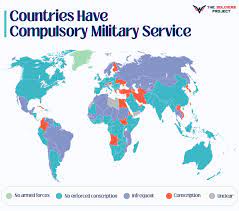Is India included among the countries where mandatory military service is a component of their national regulations?
Advert.
Is India included among the countries where mandatory military service is a component of their national regulations?
If India is not included in that list . What is the reason behind in it?

Last edited by shanu yadav; 11-13-2023 at 01:22 PM.
Some countries have compulsory military service for their citizens, while others have suspended or abolished it. The length and conditions of the service vary depending on the country. Here is a list of countries that have some form of conscription, and how long it lasts:
India does not have mandatory military service as a part of its national policy.
Algeria: 12 months for men 19-30
Angola: 24 months for men 20-45
Argentina: Conscription legal, but not used
Armenia: 24 months for men 18-27
Austria: 6-9 months for men 18-50
Azerbaijan: 12-18 months for men 18-25
Belarus: 12-36 months for men 18-27
Belize: Conscription legal, but not used
Benin: 18 months for men and women 18-35
Bhutan: Training for men 20-25, voluntary enlistment
Bolivia: 12-24 months for men 18-22
Brazil: 10-12 months for men 18-45, but only 5-10% serve
Cambodia: 18 months for men 18-30
Cape Verde: 24 months for men and women 18-35
Chad: 36 months for men 20, 12 months for women 21
Chile: 12-22 months for men 18-45, but rarely needed
China: Conscription legal, but not used
Colombia: 18 months for men 18-24
Congo (DR): Conscription legal, but unclear usage
Cuba: 24 months for men 17-28
Cyprus: 14 months for men 18-50
Denmark: 4-12 months for men 18-50, reserves until 60
Egypt: 18-36 months for men 18-30, plus 9 years reserve
El Salvador: 11-12 months for men 18
Equatorial Guinea: 24 months for citizens 18
Eritrea: 18 months for men and women 18-40, may be extended
Estonia: 8-11 months for men 18-27
Ethiopia: Conscription legal, but not used
Finland: 6-12 months for men 18, reserves until 60
Georgia: 12 months for men 18-27
Greece: 9-12 months for men 19-45
Guatemala: 12-24 months for men 17-21, but rare
Guinea-Bissau: 24 months for men and women 18-25
Indonesia: Conscription legal, but not used
Iran: 18-24 months for men 18
Israel: 24-48 months for men and women 18
Ivory Coast: Conscription legal, but not used
Jordan: 12 months for unemployed men 25-29
Kazakhstan: 12-24 months for men 18-27, may be abolished
Kuwait: 12 months for men 18-35
Kyrgyzstan: 9-12 months for men 18-27
Laos: 18 months for men 18
Lithuania: 9 months for men 19-26
Mali: 24 months for men and women 18
Mexico: 12 months for lottery-selected men 18, reserves until 40
Moldova: 12 months for men 18-27, may be abolished
Mongolia: 12-24 months for men 18-27, reserves until 45
Morocco: 12 months for men and women 19
Mozambique: 24 months for men and women 18-35
Myanmar: Conscription legal, but not used
Niger: 24 months for unmarried men and women 18
North Korea: 10 years for men 17, 5 years for women 17
Norway: 19 months for men and women 19-35, but most are released
Paraguay: 12-24 months for men 18
If India is not included in that list . What is the reason behind in it?
The Indian government opposes the idea of mandatory military training for all youth in the country for several reasons:
Democratic Principles: India operates as a democratic republic, and the constitution does not advocate for compulsory military training. The democratic system allows individuals the freedom to choose their professions, and enforcing mandatory military training is seen as contradicting these democratic values.
Risk of Militarization: There is a concern that making military training mandatory for all youth could result in the militarization of the entire nation. Given the existing socio-political and economic conditions, this is considered undesirable, as there is a risk that some unemployed individuals trained in military skills might become associated with undesirable elements.
Volunteer Availability: The Armed Forces in India already have a substantial pool of volunteers to recruit from. There is no shortage of willing individuals to join the armed forces voluntarily, making it unnecessary to mandate military training for all youth.
Infrastructure and Expenditure: Implementing compulsory military training for the entire youth population would necessitate the establishment of numerous training centers throughout the country. This would require significant resources for maintenance and upkeep. The potential benefits of providing military training to all youth are seen as inadequate compared to the substantial expenditure involved. Such an effort would impose a considerable financial burden on a developing country, straining its limited resources.